Residents living in a UK asylum capital have said while they are happy to help those fleeing conflict, the Scottish government should be looking to help the country’s less fortunate first.
Glasgow is the largest dispersal area for asylum seekers in the UK after London – with some 3,953 sent to the city by the Home Office while their applications are being considered and 240 others in emergency accommodation.
But since February 2024, a further 1,000 people have also come to the city from elsewhere in the UK in order to access homelessness support – prompting fears that the number of people applying for accommodation is becoming ‘unsustainable’.
Among them are hundreds of migrants granted leave to remain by the Home Office – who are given 28 days to find somewhere new to live and leave their Government-provided lodgings, sparking an asylum homelessness crisis.
MailOnline understands that a meeting has been arranged for the coming week between the Scottish Government and the Home Office about the matter.
It comes after Allan Casey, Glasgow City Council’s convener for homelessness said the authority was considering asking the UK Government for a pause on asylum dispersal due to the ‘unprecedented pressure’ being placed on the city’s housing.
And while locals in Scotland’s second city are internationally renowned for its welcoming attitude to those seeking refugee status, some do believe charity should start at home.
Douglas Jaap, a lawyer from Falkirk who works in Glasgow, said that ‘proportionately everybody should help’ but there should be restrictions put in place when applying for family reunion visas
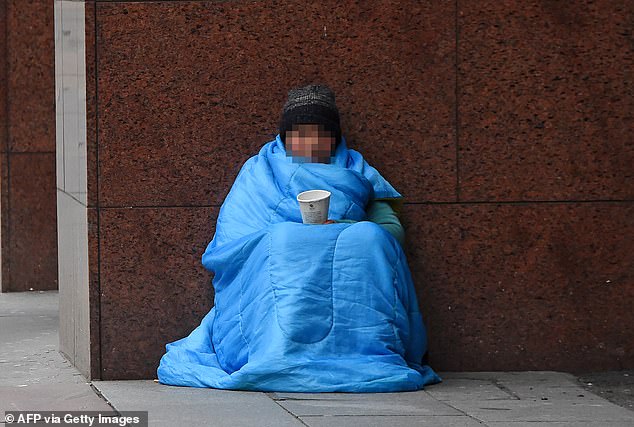
The rising number of asylum seekers presenting as homeless in Glasgow is placing an ‘unprecedented’ strain on the system, its council has warned
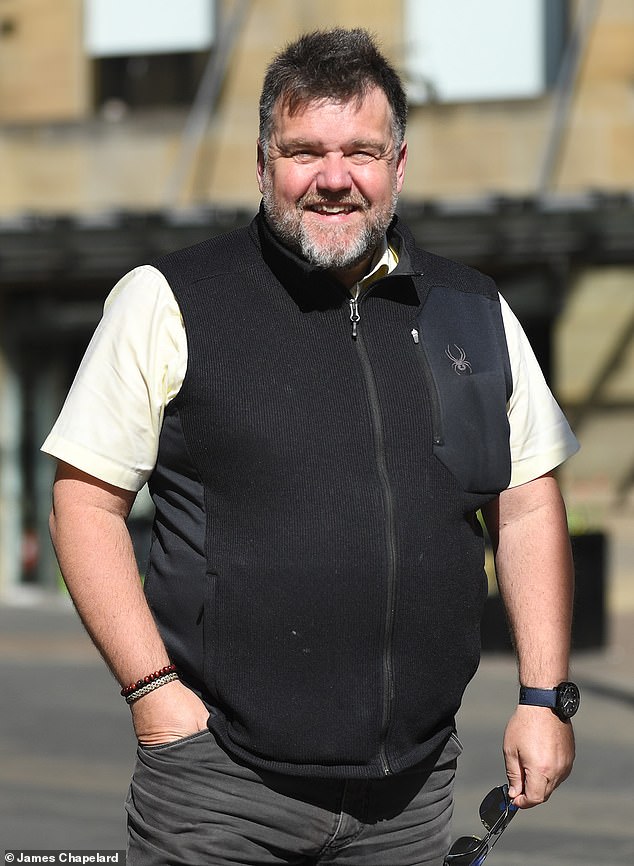
Douglas Jaap, 59, (pictured) is a great believer in being ‘charitable’ but believes you should look after ‘those less fortunate in your own country before you then look after everyone else’
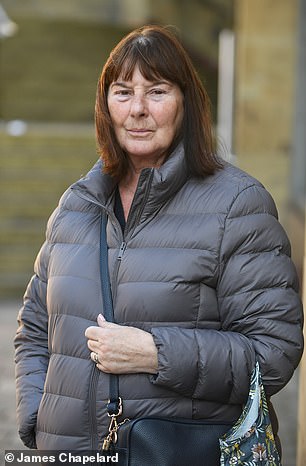
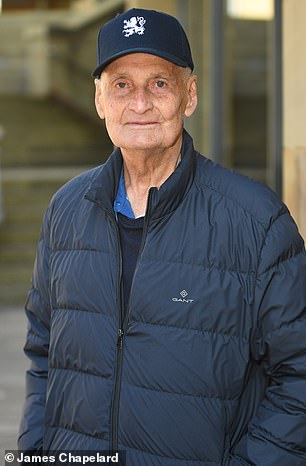
George Brown (pictured right, pictured left his wife June) said: ‘I’ve never seen as many people sitting in the street begging as here, even in London.
On the topic of the visa – which allows refugees to sponsor their immediate family members – the 59-year-old believes they shouldn’t be able to apply for them ‘where there is a shortage of homes’.
‘I’m a great believer in it’s great to be charitable,’ he said: ‘But you should look after yourselves and those less fortunate in your own country before you then look after everyone else.’
Retired couple George Brown, 87, and his wife June, 77, both originally from Scotland’s second city described the immigration as well as the homelessness situation bubbling in Glasgow as ‘unbelievable’.
On a visit to their current home from Hampshire, Mr Brown said: ‘Once they are in the UK you can’t stop them coming to Glasgow. I’ve never seen as many people sitting in the street begging as here, even in London.’
His wife June added: ‘I think the government should get a grip of all of them and stop bringing them over and put them back in their own country.
‘I think there’s too many people scrounging off the government…We are losing our sense of identity.’
The city is currently using 4,100 of its 6,735 available bed spaces for those awaiting asylum decisions according to figures provided to the Home Affairs Committee last month – more than triple the amount the Home Office says it should be using.
Glasgow Cllr Casey previously told The Guardian that he wanted to ‘work with the UK government some potential solutions’, which includes a pause on dispersal as he believes failure to act could provoke ‘social unrest’.
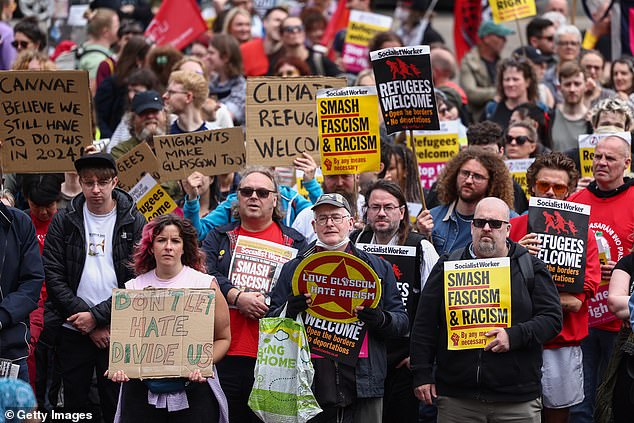
Glasgow prides itself on welcoming refugees (pictured: pro-refugee protesters) – but city leaders have warned that it cannot cope with the number of asylum seekers
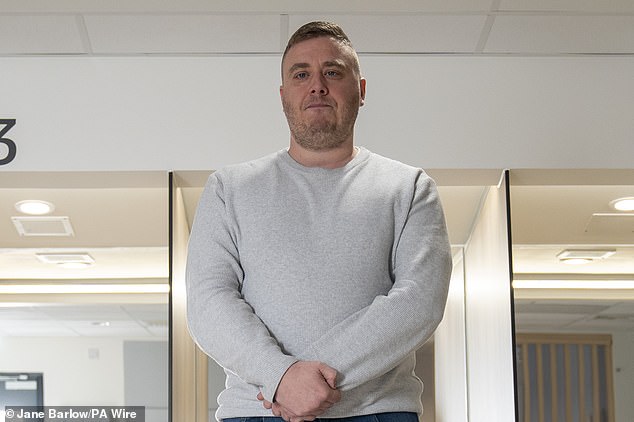
Cllr Allan Casey, Glasgow City Council’s homelessness convener, has warned that the number of applicants for housing threatened ‘social cohesion’
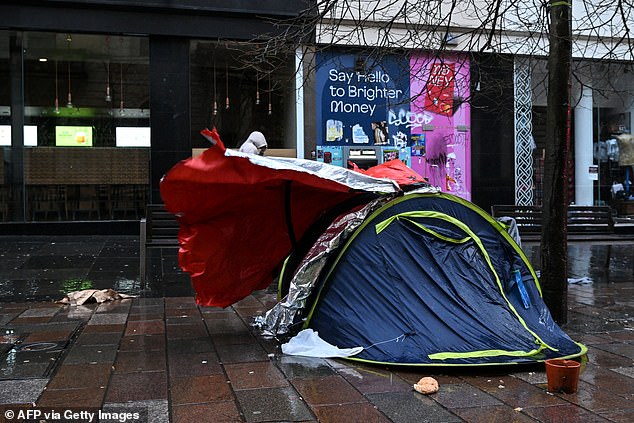
A tent blowing in the wind in Glasgow’s Buchanan Street shopping thoroughfare. Glasgow hosts a disproportionate number of asylum seekers
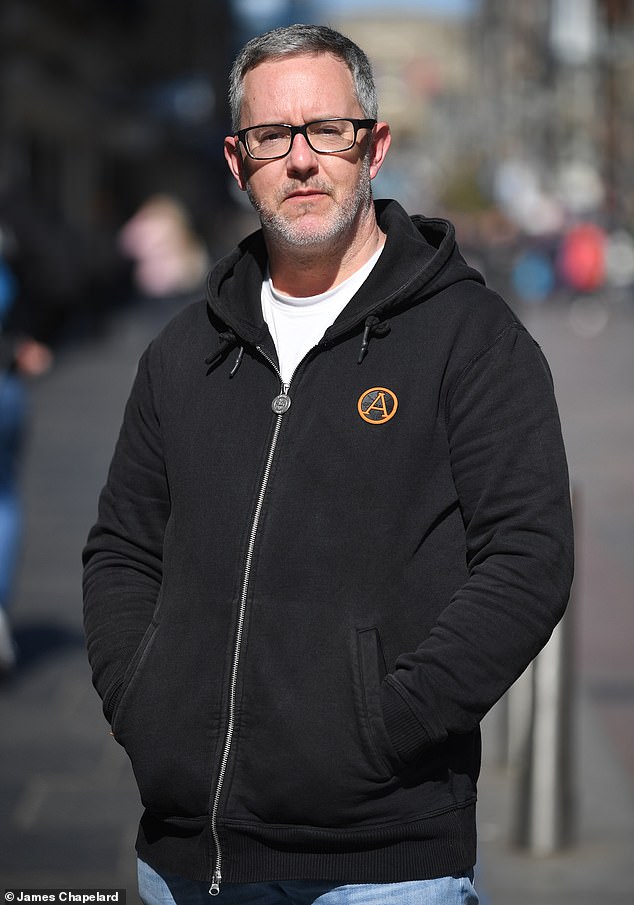
Barry Robertson, 49, (pictured) said ‘better border forces’ are needed to regulate the issue at hand
Barry Robertson, 49, who is an off-shore worker from Aberdeenshire and regularly visits Glasgow, believes the UK ‘as a whole has taken more than its fair share’, whilst adamant he take no issue with Ukrainian and Syrian families seeking asylum.
‘These guys are single males. They are coming over by boat boasting they are living in hotels.’
He added: ‘We need a better borders force. If they applied through a standard route, through correct channels and apply I don’t have a problem with that.
‘I don’t think anywhere can sustain it. Our economy is in decline at the moment and we can’t afford it.’
Lewis McLeod, 20, says Glasgow also echoed that the Scotland’s second city had taken more than its share of asylum seekers, adding that there are homeless people ‘all over the street, especially at nighttime’.
‘I think it’s a little bit of a problem,’ the student from Dunoon added: ‘It is a tricky situation but I suppose they should ask for a pause just now.
‘I live in a small town, about two hours away and you don’t get as many homeless people there so when you come into the city it’s a bit of a shock, because you see homeless people around almost every corner.’
Barber Calum Walker, 19, believes Scotland needs to solve the ‘problems’ in the country first before letting people into Glasgow.
‘We need to prioritise fixing the problems in Glasgow first,’ he said: ‘I think there’s still an is too much strain in everything here whether it’s homeless or asylum seekers.’
Nnenda Hekerem, 18, who works in McDonald’s, believes the city agrees that asylum seekers fleeing danger should always be welcome, but added that Holyrood should be putting a ‘wee bit of effort and more money into citizens pockets first.’
‘Anyone fleeing a dangerous situation is quite urgent and you can’t criticise them cause they are trying to do their best,’ he said.
‘If you are born and raised in Scotland and end up homeless and you see the Scottish government letting people from another country have housing and more and they have not given you it, I don’t think that’s very fair.’
Politics student Breagha McMahon, 20, believes Glasgow has taken in plenty of refugees but doesn’t feel as though the city has been ‘overrun’.
‘I think this is a major city. I’d rather have them here and safe than whatever horrible place they’ve come from. If people have left, there’s a reason that they have left,’ she said.


Politics student Breagha McMahon, 20, (pictured right) believes Glasgow has taken in plenty of refugees but doesn’t feel as though the city has been ‘overrun’ (Pictured left: Lewis McCleod)
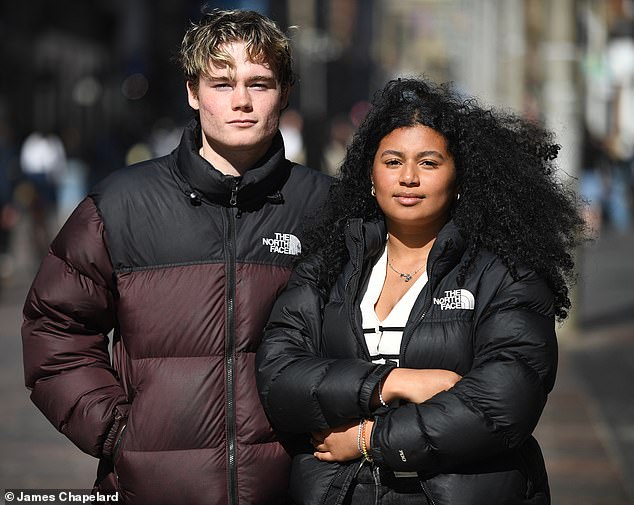
Nnenda Hekerem, 18, (pictured with Calum Walker, 19,) said Holyrood should be putting a ‘wee bit of effort and more money into citizens pockets first
‘I do think there’s things that we need to work on for people like Glaswegians, in terms of, the homelessness here which is a big problem.
She continued: ‘If we’re going to turn everything on the city centre into student housing, then why not keep a couple of places for everyone else who needs it?’
While asylum seekers cannot choose where they are dispersed to, other people facing destitution are thought to come to Glasgow because of Scotland’s steadfast homelessness laws.
Unlike other parts of the UK, Scottish local authorities are also required by law to treat all homeless-presenting individuals as needing a place to stay with priority, regardless of their situation.
Those who are granted refugee status are typically given 28 days to leave their temporary accommodation and find a new place to live.
However, waits for documentation needed to secure tenancies and Universal Credit claims can be much longer, forcing people onto the streets.
The Home Office is piloting a doubling of the time to 56 days amid criticism that the existing limit is too small and that asylum seekers, who cannot work while their application is being considered, have little money with which to arrange a tenancy.
The Scottish Refugee Council is hopeful this will ease the pressure on councils and alleviate some of the strain. It also wants asylum seekers to be able to work while their application is being considered – a move it says is backed by the public.
‘When people receive a positive decision about their asylum application… there are a lot of significant changes to navigate in a very short space of time,’ a spokesperson said.
‘People seeking asylum are not allowed to work to support themselves or their families and, with many are living on as little as £1.25 a day, very few people have savings for a rental deposit or the up-front costs required for moving.
‘All levels of government have a duty to come together and agree a robust response to help the thousands of people affected by homelessness in Glasgow.’
More than 40 per cent of homelessness applications being processed in Glasgow come from refugee households.
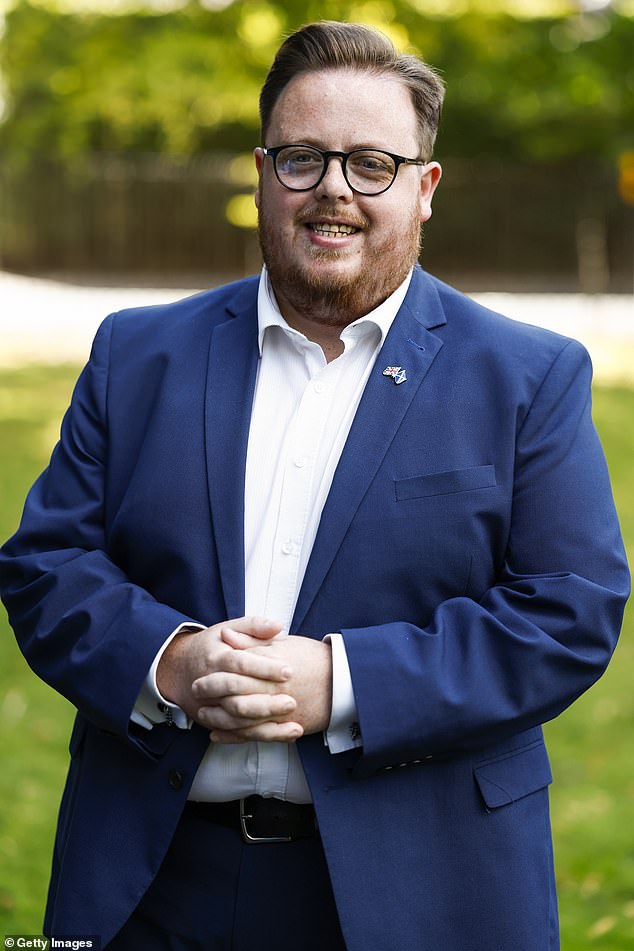
Glasgow Reform councillor Thomas Kerr (pictured) has called the SNP-run council’s warning shot an ’empty gesture’
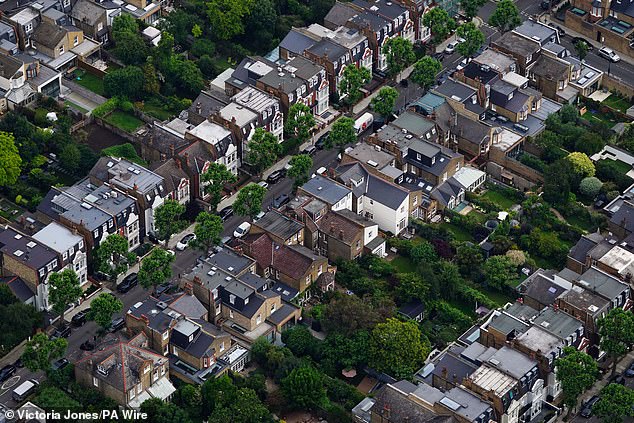
The city declared a housing emergency in 2023 after the Home Office streamlined its asylum applications process – amid a doubling in the number of homeless refugees
But people may also come to Glasgow because it is renowned for its friendliness towards asylum seekers, as evidenced by scenes of entire neighbourhoods coming out to block Home Office deportation vans in 2021.
A Glasgow HSCP report published in January noted that people may be fleeing England because of ‘significant hostile behaviour towards asylum seekers and refugees, culminating in protests and the targeting of hotels’.
The report added: ‘Whilst Glasgow has always been, and will continue to be, a welcoming city for those fleeing persecution, it is evident that an increase in asylum cases… make(s) it challenging for Glasgow to continue to commit to the national framework in relation to asylum seekers and refugees.’
The issue is compounded by those who are granted leave to remain then applying for family reunion visas – placing significant strain on the city, which lacks the stock to accommodate larger households.
It presents an additional issue for the city council, which is already having to find additional accommodation as the Home Office expedites its asylum assessments process in order to clear the backlog.
Official Home Office figures for the year to December 2024 state Glasgow has 4,193 supported asylum seekers living in accomodation, including 240 in emergency lodgings – making up 0.66 per cent of its 630,000 population.
That dwarfs the proportion of asylum seekers in similarly sized city councils such as Manchester (0.34 per cent), Sheffield (0.22 per cent) and Leeds (0.4 per cent).
And the number of people presenting as homeless who have been given leave to remain has doubled to 2,709 as of last year, according to a social work report scrutinised by the Local Democracy Reporting Service.
The city’s health and social care partnership (HSCP) estimates that Home Office expedited decisions will cost Glasgow £26.5million in 2024/25, according to a recent report.
The reasons are partly historical: Glasgow was, until 2022, the only city in Scotland to which the Home Office would disperse asylum seekers. As of now, more than nine in 10 asylum seekers supported in Scotland live in Glasgow.
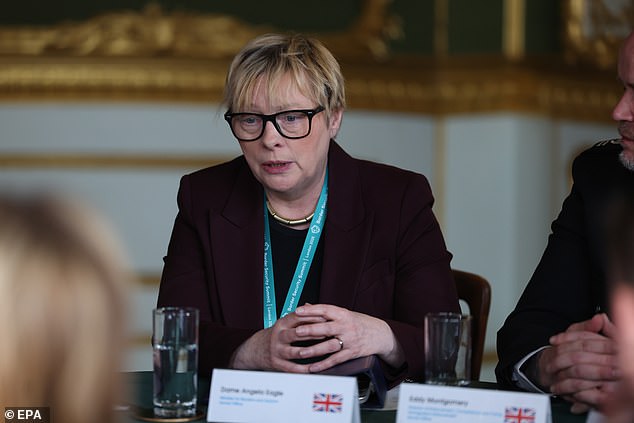
Labour asylum minister Angela Eagle (pictured) has been warned Glasgow faces ‘utterly untenable’ pressures
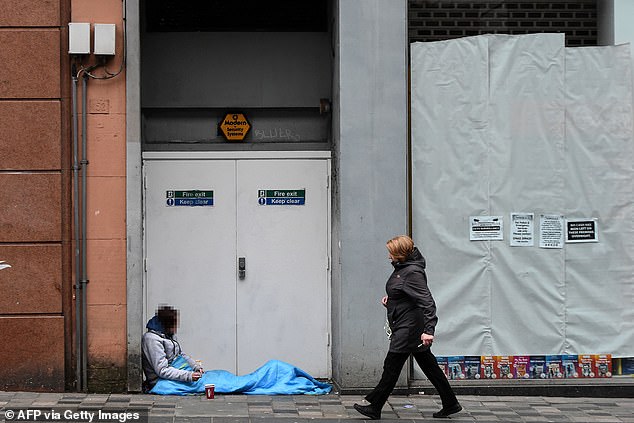
The city’s population of homeless refugees – those already granted leave to remain after seeking asylum – is rising
Edinburgh, which has a population of 523,000, is home to just 173 asylum seekers, of which all but nine are in unsuitable ‘contingency’ quarters such as hotels or B&Bs.
And including resettled Ukrainian and Afghan refugees, Glasgow has an asylum seeker population of 0.77 per cent – higher than anywhere in Britain except Chichester, Coventry, and half a dozen London boroughs.
The number of homeless refugees doubled in the city in 2023 as the Home Office tried to accelerate its efforts to clear the backlog of applications – making 2,500 batched decisions by the end of that year.
This prompted Glasgow to declare a housing emergency, which remains ongoing.
In February, the council wrote to the owners of 2,500 empty homes asking them to consider selling up or renting them out. It has even invoked compulsory purchase orders to buy up empty homes that have lain unused.
A government spokesperson previously said: ‘We have implemented a pilot scheme to double the move-on period, allowing newly recognised refugees 56 days to move on from the point they are served their grant of leave, while also supporting local authorities as this government clears the asylum backlog.
‘There is a clear need for a smooth transition between asylum accommodation and other accommodation for asylum seekers granted leave to remain, which is why we are working to identify and implement efficiencies to support this process and mitigate the risk of homelessness.’







